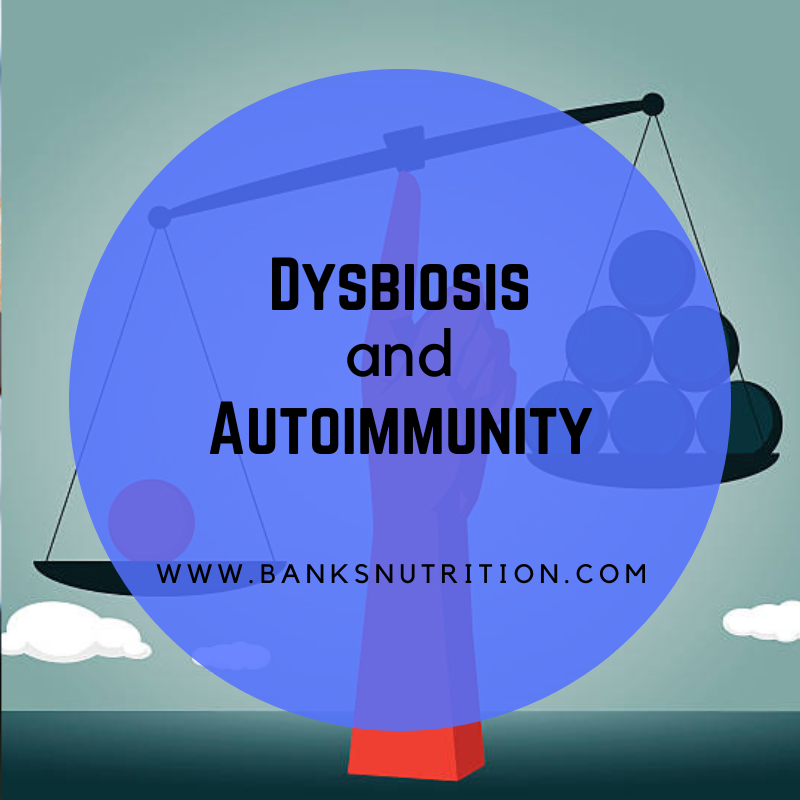
Dysbiosis and Autoimmunity
December 27, 2022
As we discussed in the previous blog post, disruption of the single cell intestinal barrier which separates the immune layer from the contents of the intestinal lumen is a known component to the onset of autoimmunity. A leaky gut barrier allows highly inflammatory and immune activating bacterial particles called lipopolysaccharides (LPS) to flood into the gut immune layer. It also allows poorly digested food proteins/peptides into this immune layer triggering inflammation and antibody production.

We also mentioned what factors may contribute to leaky gut and thus the triggering of autoimmunity including:
- Dysbiosis, or a shift in the normal microbiome to a less healthy composition.
- Food sensitivities or immune reactions against food molecules.
- Food additives such as emulsifiers.
- Dietary chemicals such as glyphosate.
- Stress

First in this list is dysbiosis which is an imbalance in the 100 trillion microbes, predominantly bacteria, that inhabit the human gut. The bacteria in a healthy microbiome provide protection to the intestinal barrier. Some do this by stimulating the production of mucin which coats the barrier keeping the contents of the gut back from the single cell membrane. A shift in the bacteria dominating in the gut, dysbiosis, triggers inflammation and inhibits mucin production causing the loss of this important protective layer.
A healthy protective layer of mucin is shown in the left side of this image. The eroded mucin layer caused by dysbiosis is shown on the right side. The inflammation that the dysbiotic bacteria cause result in the breakdown of the tight junctions between barrier cells allowing the toxins LPS to enter the body triggering systemic immune activation/inflammation.
The intestinal infections such as cholera and salmonella are well known to cause breakdown of the gut barrier. These infections cause significant diarrhea which is the result of fluid in the wall of the intestine to run into the gut lumen through the leaky barrier. The researcher, Alessio Fasano, MD who discovered this phenomenon, suggests that it is the intestines attempt to wash out these dangerous bacteria. It is now appreciated that a less severe shift in the microbiome, dysbiosis, causes the same barrier disruption but is less acute and dramatic.
Because dysbiosis tends to be a chronic and ongoing problem, a chronic systemic immune/inflammatory reaction occurs. This causes “chronic overload” of the immune system increasing the risk of it making a mistake and reacting to self tissue – autoimmunity. The leaky barrier also allows poorly digested food proteins into the immune layer. Larger protein pieces called peptides normally are excluded from the gut immune layer, and they are fully digested into amino acids before absorption preventing immune reaction to them.
Many modern lifestyle associated factors such as diet and antibiotic use can cause dysbiosis. This unhealthy shift in the makeup of the microbiome from helpful to harmful bacteria is very common. The microbes in the gut “share” food with us. The standard western diet of refined carbohydrates, sugar and food additives have been shown to make the gut a more inhabitable environment for the less healthy bacteria.
Antibiotics diminish the good bacterial population in the gut allowing overgrowth of the less healthy bacteria. A well known example of that is the development of a severe infection with Clostridia difficile after heavy antibiotic use. It has been assumed that the normal microbiome which helps to suppress the growth of dysbiotic bacteria would simply return on its own after antibiotic use, but this is not the case. A small group of “keystone species” have been identified as the difference between a healthy, immune regulating microbiome and the unhealthy dysbiotic one. Targeting those keystone species which are typically not in most probiotic supplements is essential to restoring the microbiome.
In the next blog we will discuss immune reactions to food called food sensitivities as a trigger to autoimmunity. Perhaps the best known is celiac disease where an immune reaction to peptides in gluten causes cross reaction against small intestinal tissue destroying the gut lining. Celiac disease is far from the only gluten triggered autoimmune disease and other food peptides may also cause similar reactions. That interesting topic is next!